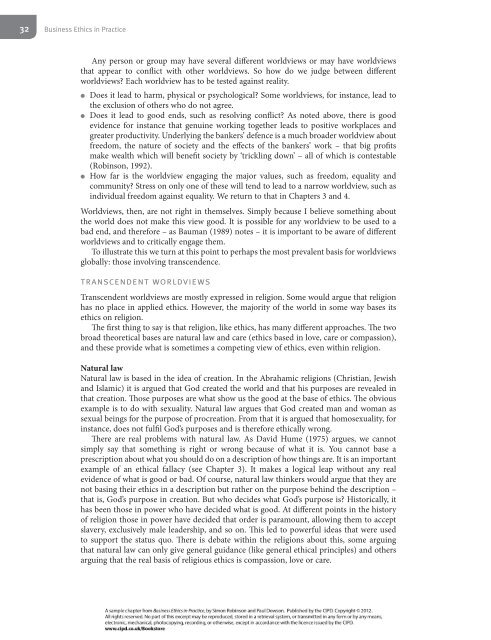normative Ethical theory - CIPD
normative Ethical theory - CIPD
normative Ethical theory - CIPD
You also want an ePaper? Increase the reach of your titles
YUMPU automatically turns print PDFs into web optimized ePapers that Google loves.
32Business Ethics in PracticeAny person or group may have several different worldviews or may have worldviewsthat appear to conflict with other worldviews. So how do we judge between differentworldviews? Each worldview has to be tested against reality.●●●●●●Does it lead to harm, physical or psychological? Some worldviews, for instance, lead tothe exclusion of others who do not agree.Does it lead to good ends, such as resolving conflict? As noted above, there is goodevidence for instance that genuine working together leads to positive workplaces andgreater productivity. Underlying the bankers’ defence is a much broader worldview aboutfreedom, the nature of society and the effects of the bankers’ work – that big profitsmake wealth which will benefit society by ‘trickling down’ – all of which is contestable(Robinson, 1992).How far is the worldview engaging the major values, such as freedom, equality andcommunity? Stress on only one of these will tend to lead to a narrow worldview, such asindividual freedom against equality. We return to that in Chapters 3 and 4.Worldviews, then, are not right in themselves. Simply because I believe something aboutthe world does not make this view good. It is possible for any worldview to be used to abad end, and therefore – as Bauman (1989) notes – it is important to be aware of differentworldviews and to critically engage them.To illustrate this we turn at this point to perhaps the most prevalent basis for worldviewsglobally: those involving transcendence.transcendent worldviewsTranscendent worldviews are mostly expressed in religion. Some would argue that religionhas no place in applied ethics. However, the majority of the world in some way bases itsethics on religion.The first thing to say is that religion, like ethics, has many different approaches. The twobroad theoretical bases are natural law and care (ethics based in love, care or compassion),and these provide what is sometimes a competing view of ethics, even within religion.Natural lawNatural law is based in the idea of creation. In the Abrahamic religions (Christian, Jewishand Islamic) it is argued that God created the world and that his purposes are revealed inthat creation. Those purposes are what show us the good at the base of ethics. The obviousexample is to do with sexuality. Natural law argues that God created man and woman assexual beings for the purpose of procreation. From that it is argued that homosexuality, forinstance, does not fulfil God’s purposes and is therefore ethically wrong.There are real problems with natural law. As David Hume (1975) argues, we cannotsimply say that something is right or wrong because of what it is. You cannot base aprescription about what you should do on a description of how things are. It is an importantexample of an ethical fallacy (see Chapter 3). It makes a logical leap without any realevidence of what is good or bad. Of course, natural law thinkers would argue that they arenot basing their ethics in a description but rather on the purpose behind the description –that is, God’s purpose in creation. But who decides what God’s purpose is? Historically, ithas been those in power who have decided what is good. At different points in the historyof religion those in power have decided that order is paramount, allowing them to acceptslavery, exclusively male leadership, and so on. This led to powerful ideas that were usedto support the status quo. There is debate within the religions about this, some arguingthat natural law can only give general guidance (like general ethical principles) and othersarguing that the real basis of religious ethics is compassion, love or care.

















